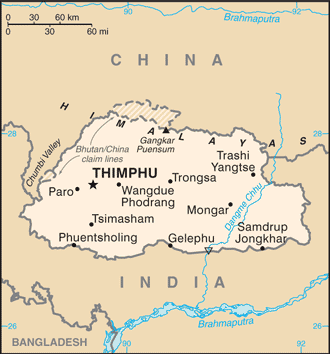Bhutan
Reliability index
4
(poor)
GDP
~US$1.3-billion 2009
Defense Budget
~US$16-million 2009
[Excludes India aid]
|
|
Much of the information on Bhutan defense is classified and the
opportunities to ferret it out are limited. That is why we continue
to classify Bhutan as Reliability Index 4 (Poor)
Summary of Forces
All forces
listed below work under the operational command of the Royal Bhutan
Army HQ.
Royal Bodyguard
1000
Army
8000[1] (18+ wings)
Militia
10,000[2]
Police
6,000 [Expanding]
Forest Guards
600
Royal Bodyguard
Members of the Royal Body
Guards (an elite VIP protection unit commanded by a lieutenant
colonel) have completed counterinsurgency and jungle warfare
training in the Mizo Hills in India, and have attended the Indian
College of Combat and the Indian Military Academy.
Army Wings
A wing
consists of 3 rifle companies commanded by a Lt.-Colonel. We
estimate it has less than 500 personnel. What in normal–sized
battalions are the administrative and weapons companies have
considerably smaller numbers of personnel.
Data below
is from Complete World Armies 2007 and is presented as an extra.
While we use decimal integers for wing designations to make reading
easier, the formal designations use Roman numerals.
The use of
different spelling makes some locations problematical. Also, in many
cases a wing can be identified with two names, for example, Wing V
is at Shaba in Paro District.
In 2005,
after the 2003 operation against anti-India, anti-Bhutan, and
anti-Nepal insurgent groups using Bhutan as their base, the
government announced a reduction in the army. The insurgent problem
has, however, remained and
|
Wing 1 |
Changjukha (Geylegphug) |
Original wings |
|
Wing 2 |
Damthang |
|
|
Wing 3 |
Goinichawa |
|
|
Wing 4 |
Yonphula |
|
|
Wing 5 |
Shaba (Paro) |
1990s expansion |
|
Wing 6 |
Phodrang |
|
|
Wing 7 |
|
|
|
Wing 8 |
Deothang |
|
|
Wing 9 |
Gelephu
|
|
|
Wing 10 |
Deothang |
|
|
Wing 11 |
Geylegphug |
2002-2003 expansion |
|
Wing 12 |
Phodrang |
|
|
Wing 13 |
Deothang |
|
|
Wing 14 |
Deothang |
|
|
Wing 15 |
Deothang |
|
|
Wing 16 |
Gelephu |
|
|
Wing 17 |
|
Planned 2002-2003 but may not have raised |
|
Wing 18 |
|
|
|
Wing 19 |
|
|
|
Wing 20 |
|
|
Aviation
1 x Dornier
227
2-4 x Mi-8
Insurgent Groups
·
Anti government Nepalese group
claiming to fight for the rights of Bhutan’s ethnic Nepalese.
Strength about 800.
·
Anti-India groups include
-
United Liberation Front of Assam, 4 new
camps. 7th Battalion.
-
Kamtapur Liberation Organization; no details
on new camps
-
National Front of Bodoland: not known to be
back in Bhutan.
India has 12,000 paramilitary troops on its side of the
approximately 700 km border.
Indian Military Training Team, Bhutan [IMTRAT]
The Indian
military presence in Bhutan is extensive, few details are known.
Under plans now relegated to contingency, two Indian divisions
enterd Bhutan on mobilization against a China crisis, one in the
west and one in the east. With the reduction in the perceived threat
from China in the 1990s, IMTRAT's strength likely came down from a
rumored total of 5,000, but it is probable the strength increased
again due to the need to combat anti-Indian insurgents using Bhutan
as a safe haven. Indian military vehicles in Bhutan are known to
carry local license plates, a move designed in part to reduce the
Indian Army's visibility.
IMTRAT
operates in 3 "detachments", a misleading term considering the
"Team" is headed by a major-general. The detachments are located at
Thimpu, the capital; Haa, to the west, and at Phuentsholing near the
Indian border south of Thimpu. This last is in effect a reception
base for Indian forces transiting to and from Bhutan. Haa is the
Indian Army main wartime base against Chinese positions in the
Chumbi Valley.
Indian Border Roads Organization Project DANTAK
The Indian BRO is manned by the General Reserve Engineer Force and
is organized military style. Indian Army personnel man its backbone;
the rank and file are civilian contract labor. DANTAK has
constructed 1,500-kilometers of road in Bhutan over the last 45
years.
Approximately 1600-km is blacktopped and the rest is unsurfaced.
National highway trunk roads have been upgraded to take 30-ton
trucks. Major projects underway/planned to 2027 in partnership with
the Bhutan Department of Roads include a second east-west highway
(800-kms); 2600-km feeder roads, and 400-km roads for inter-district
connectivity.
